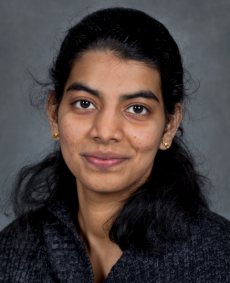Women's History Month, 2017: Sowmya Balasubramanian, ESnet
March 24, 2017
« Back to Overview |
Leen Alawieh » |
Sowmya Balasubramanian » |
Deborah Bard » |
Tina Declerck » |
Mariam Kiran » |
Lavanya Ramakrishnan » |
Jackie Scoggins » |
Francesca Verdier » |
Sowmya Balasubramanian, originally from Chennai, India, first joined ESnet as a summer student in 2009 to work on ESnet's weather map prototype, a map that showed real-time utilization of its links that has now developed into a full-fledged my.es.net portal project. After graduating from Carnegie Mellon University with a master’s in information networking, she returned to ESnet in 2010 as a full-time computer science engineer.
What drew you to working at ESnet?
I really liked the people and the culture at ESnet. Plus, the fact that they are doing world-class work drew me to ESnet.
What are some of your proudest achievements?
On the technical side, I am proud of my Simple Lookup Service project. That was my first project as a lead developer. I was driving the design decisions, doing research on what products/libraries to use, break down the tasks into smaller tasks, planning the implementation, release, licensing etc. Of course, my team members were there to brainstorm and offer suggestions and guide.
In addition, the work I have been doing for improving diversity and inclusion at ESnet has been one of my most fulfilling. I work on policies, workshops and a wide variety of other activities as part of this. I conduct computer networking workshops using Raspberry Pi targeted at students which have always received a wonderful response. One time, a student, after the workshop came and said after attending the session, he was now inspired to take a networking class in school and learn more about them. That was one of my happiest moments.
What is your favorite thing about working at ESnet or at the lab in general?
What I love about working at ESnet is the amount of intellectual exchange that happens here. People are constantly exploring new ideas and concepts. Everyday is different. And, the work we are doing helps science. That is what I like best.
What are some of the challenges you have faced being a woman in what has traditionally been a male-dominated field?
I think dealing with unconscious bias has been the biggest challenge for women and for any minority group in general. Primarily because one can never prove unconscious bias and one can never be sure if one is being discriminated against on the basis of unconscious bias. For example, if a woman is too soft-spoken, she is not taken seriously. So, she can't make progress in her career. On the other hand, if she is too outspoken, then she is labeled as too aggressive and supervisors are hesitant to give her more opportunities. Then one is left wondering, how can women then make progress if she is labeled and judged for who she is?
What lessons have you learned along the way that you would share with other women thinking about working in this field, or in a science/technology/engineering position in general?
One, it is important to have a strong support group. It could be in your workplace or your group of friends and family. Also, it is important to spread awareness about unconscious bias and other diversity- and inclusion-related issues. People are not always aware that such biases exist. If people and organizations are not even aware of the problems, then how can we address it? So it is important to create awareness.
About Computing Sciences at Berkeley Lab
High performance computing plays a critical role in scientific discovery. Researchers increasingly rely on advances in computer science, mathematics, computational science, data science, and large-scale computing and networking to increase our understanding of ourselves, our planet, and our universe. Berkeley Lab’s Computing Sciences Area researches, develops, and deploys new foundations, tools, and technologies to meet these needs and to advance research across a broad range of scientific disciplines.







 Instagram
Instagram YouTube
YouTube